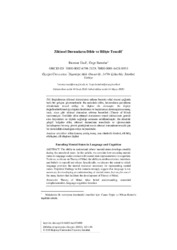Zihinsel durumların dilde ve bilişte temsili
| dc.contributor.author | Ünal, Ercenur | |
| dc.contributor.author | Baturlar, Özge | |
| dc.date.accessioned | 2021-06-15T09:42:57Z | |
| dc.date.available | 2021-06-15T09:42:57Z | |
| dc.date.issued | 2020 | |
| dc.identifier.issn | 1300-8552 | en_US |
| dc.identifier.uri | http://hdl.handle.net/10679/7434 | |
| dc.identifier.uri | http://dad.boun.edu.tr/tr/pub/issue/55345/676900 | |
| dc.description.abstract | Başkalarının zihinsel durumlarını anlama becerisi okul öncesi çağlarda hızlı bir gelişim göstermektedir. Bu makalede dilin, kavramların çocukların zihinlerinde temsil edilişi ile ilişkisi ele alınmıştır. Bu ilişkiyi değerlendirebilmek için kişinin kendisinin ve başkalarının davranışlarına inanç, istek, niyet gibi zihinsel durumları atfetme becerileri (Theory of Mind) incelenmiştir. Özellikle dilin zihinsel durumların temsil edilmesinde gerekli olan kaynakları ne ölçüde sağladığı sorusuna odaklanılmıştır. Bu alandaki görgül bulgular dilin, zihinsel durumların temsilinde ve işlenmesinde kolaylaştırıcı bir araç görevi gördüğünü ancak zihinsel durumların temsili için bir zorunluluk olmadığını ortaya koymaktadır. | en_US |
| dc.description.abstract | The ability to understand others’ mental states develops steadily during the preschool years. In this article, we consider how encoding mental states in language makes contact with mental state representations in cognition. To do so, we focus on Theory of Mind, the ability to attribute desires, intentions and beliefs to oneself and others. Specifically, we discuss the extent to which language provides the mental resources necessary for representing mental states. Empirical findings in this domain strongly suggest that language is not necessary for developing an understanding of mental states, but may be one of the many factors that facilitate the development of Theory of Mind. | |
| dc.language.iso | tur | en_US |
| dc.publisher | Bogazici University Press | en_US |
| dc.relation.ispartof | Dilbilim Araştırmaları Dergisi | |
| dc.rights | openAccess | |
| dc.title | Zihinsel durumların dilde ve bilişte temsili | en_US |
| dc.title.alternative | Encoding mental states in language and cognition | |
| dc.type | Article | en_US |
| dc.description.version | Publisher version | en_US |
| dc.peerreviewed | yes | en_US |
| dc.publicationstatus | Published | en_US |
| dc.contributor.department | Özyeğin University | |
| dc.contributor.authorID | (ORCID 0000-0002-6794-2129 & YÖK ID 301136) Ünal, Ercenur | |
| dc.contributor.ozuauthor | Ünal, Ercenur | |
| dc.identifier.volume | 31 | en_US |
| dc.identifier.issue | 1 | en_US |
| dc.identifier.startpage | 123 | en_US |
| dc.identifier.endpage | 140 | en_US |
| dc.identifier.doi | 10.18492/dad.676900 | en_US |
| dc.subject.keywords | Zihin kuramı | en_US |
| dc.subject.keywords | Yanlış inanç | en_US |
| dc.subject.keywords | Yan cümlecik tümleci | en_US |
| dc.subject.keywords | Dil-biliş etkileşimi | en_US |
| dc.subject.keywords | Dil-düşünce ilişkisi | en_US |
| dc.subject.keywords | Theory of mind | en_US |
| dc.subject.keywords | False belief understanding | en_US |
| dc.subject.keywords | Sentential complementation | en_US |
| dc.subject.keywords | Language-cognition interface | en_US |
| dc.identifier.scopus | SCOPUS:2-s2.0-85087122904 | |
| dc.contributor.ozugradstudent | Baturlar, Özge | |
| dc.contributor.authorFemale | 2 | |
| dc.relation.publicationcategory | Article - International Refereed Journal - Institutional Academic Staff and Undergraduate Student |
Files in this item
This item appears in the following Collection(s)
Share this page



